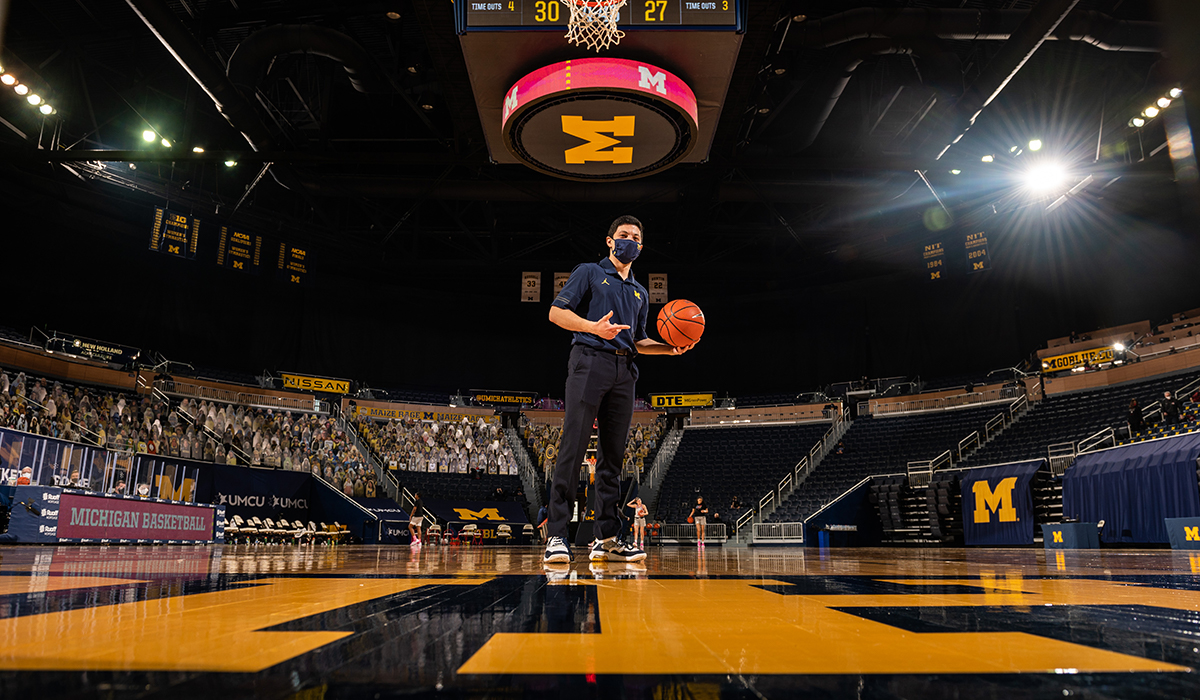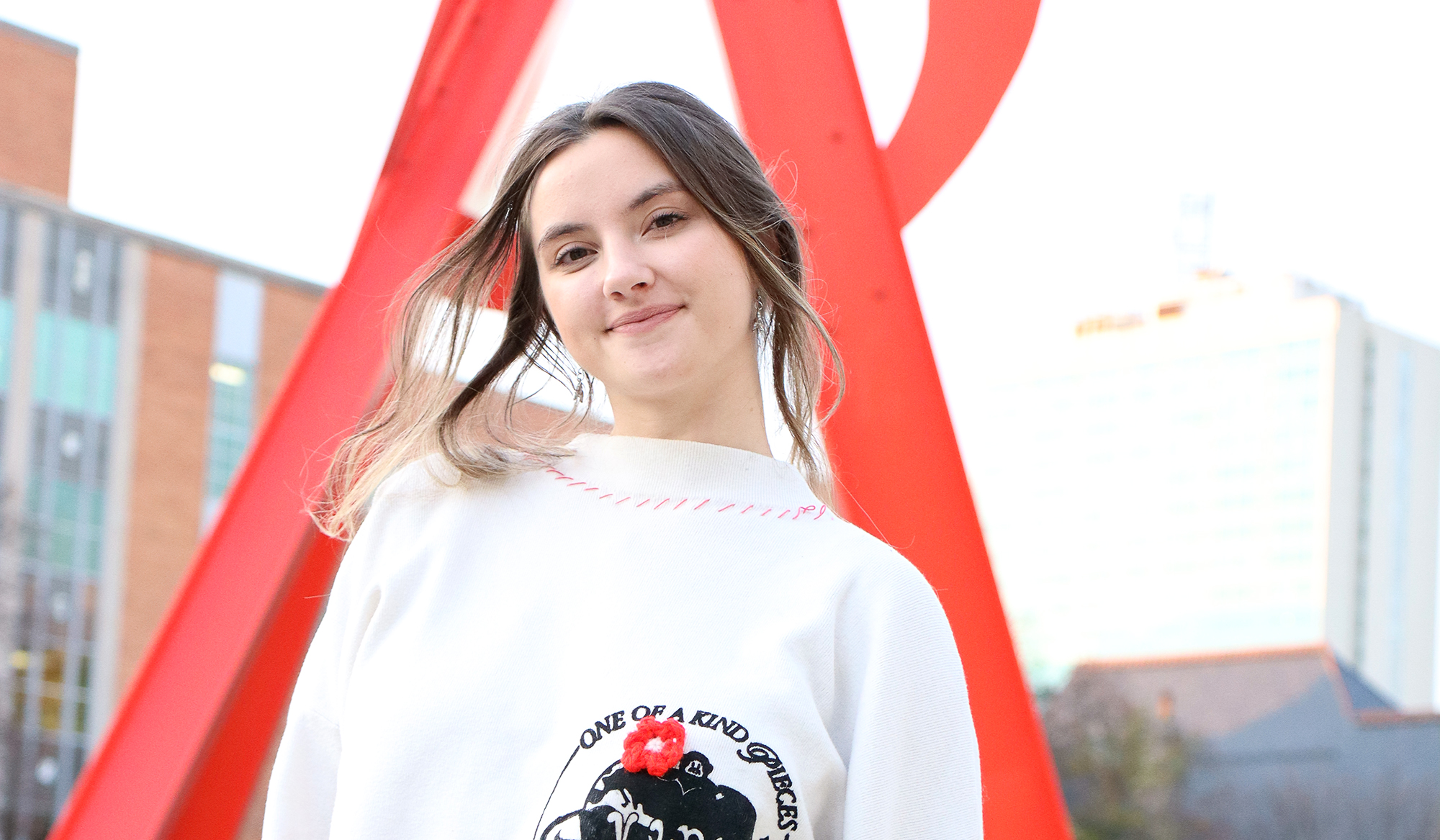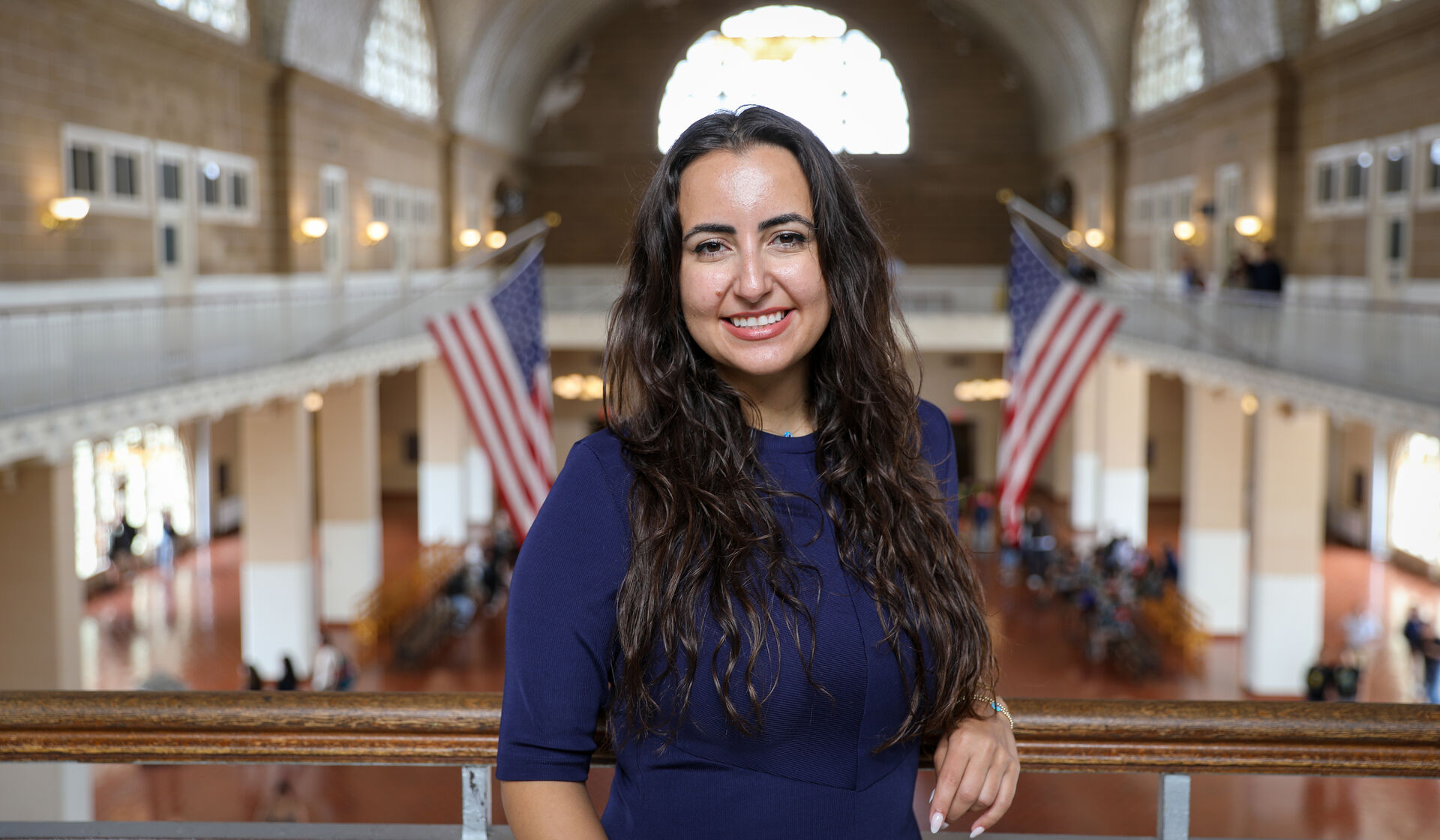They often show up at the Crisler Center hours before the players and leave long after a practice or game is over. Some of their duties offer a sheen of glamor — traveling to exotic locales, sitting on the sidelines at nationally broadcast games, enjoying an enviable flow of U-M swag and proximity to the biggest men and women on campus. But other duties aren’t quite so glamorous — picking up used locker room towels; wiping sweat off the hardwood; running ragged while retrieving rebounds for players, sometimes into the wee small hours.
For the phalanx of student managers who toil — usually for free, some for scholarship money — in support of U-M basketball, most take their reward largely in satisfaction when the teams do well, as both the men’s and women’s squads have during the 2020-21 season. “To put it simply, being a manager is being a relatively small cog in a big machine that allows coaches to focus solely on coaching and players to play,” says Matt Sawyer, ’13, who as a senior worked for the men’s team when it went to the Final Four of the NCAA Tournament in 2013. “We took a lot of pride in doing the things that no one noticed to support a championship run.”
In non-pandemic times, each team typically has about 20 student-managers who spend long hours providing a complex range of support services, from tracking detailed statistics to shooting, editing, and logging film of players during practice and games, from picking up food orders to laundering the team jerseys. Head managers, typically juniors or seniors, travel with the team, often finding themselves using athletic tape to turn the hotel ballroom floors into makeshift basketball courts so the team can walk through plays without needing to visit a gym.
This year, because of COVID-19 restrictions that required frequent testing and tight bubbles, each team has made do with about half the usual crew doing double the work.
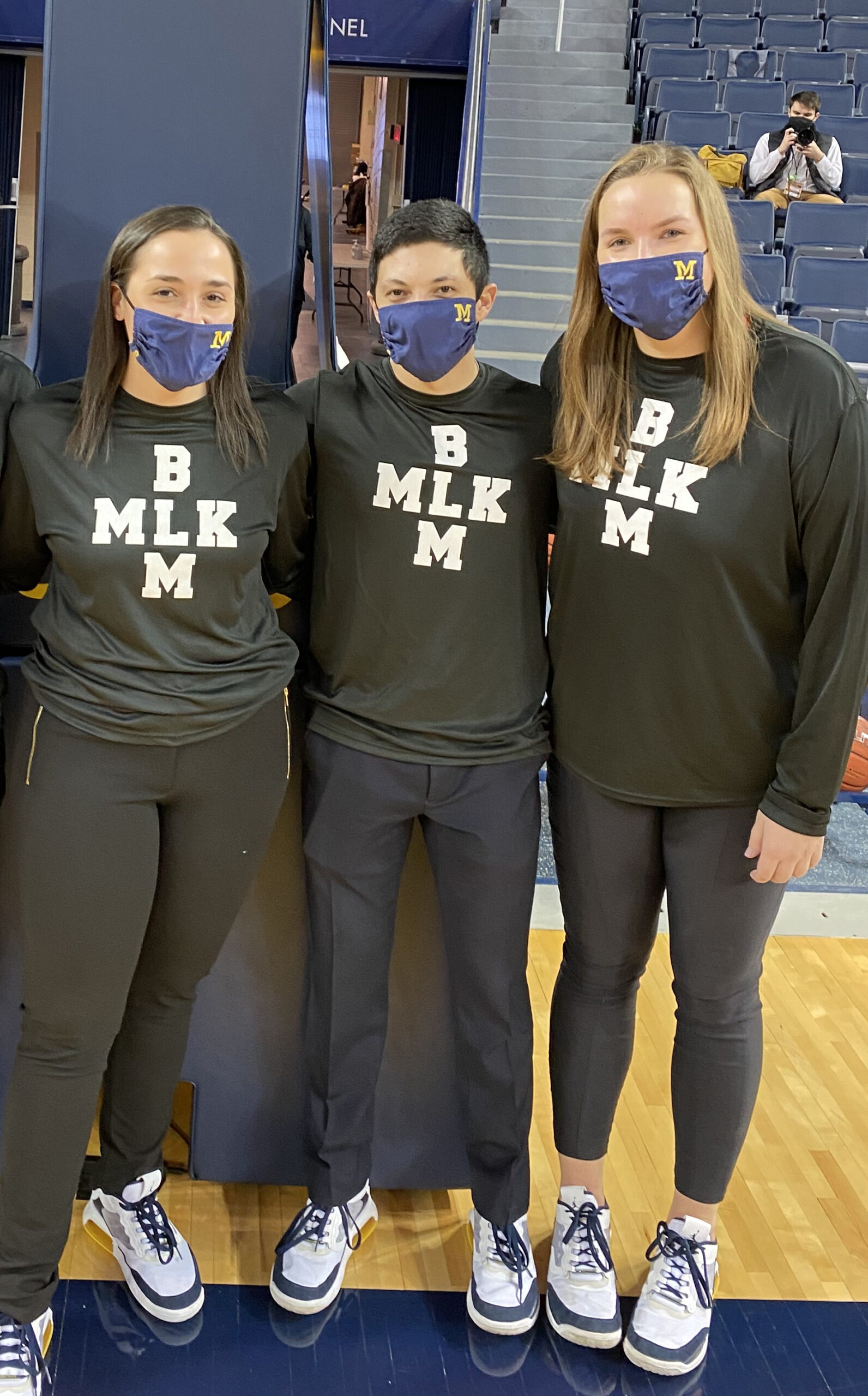
“They are probably the most selfless people in our program,” women’s head coach Kim Barnes Arico says. “They’re taking time out of their tough academic schedules — and most of them are exceptional students as well — to do all the hard tasks that nobody wants to do that help the program run as smoothly as it does. Our managers make it a first-class operation. And they do it to be around something bigger than themselves.”
Echoing that appreciation is men’s head coach Juwan Howard, ’97, whose team clinched the Big Ten title on March 4 (see sidebar). Earlier in the season, following the team’s win on Jan. 12 against Wisconsin, he gave a shoutout to the managers. “I give all the credit to the … players and staff — and our managers. Everyone is a major contributor to the success that we’re having.”
Their paths to the posts vary, although many have elements of luck, persistence, and networking. Sawyer, for instance, made contact with U-M player David Merritt, ’08, via Facebook before getting to campus, which led to a series of connections that got him an interview and then a position. Current senior Jalen Massey was about to transfer to U-M from Washtenaw Community College when he happened to meet then-head student manager Zach Napont, ’19, MA’20, while out on a Friday night in Ann Arbor. He pestered him for a year about how to get the gig on the men’s team. Nick Lemmer, ’14, who worked with the women’s team from 2009 to 2014, had known then-head coach Kevin Borseth for years. Borseth had been a coach at Michigan Technological University and occasionally worked with Lemmer’s father, a local high school basketball coach. Emily Anderson, now a women’s team head manager, says she reached out to the coaching staff at the onset of her sophomore year to see if she could do anything because she missed the camaraderie of sports she enjoyed as a high school athlete.
“Our managers make it a first-class operation. And they do it to be around something bigger than themselves.”
— Kim Barnes Arico, women's head coach
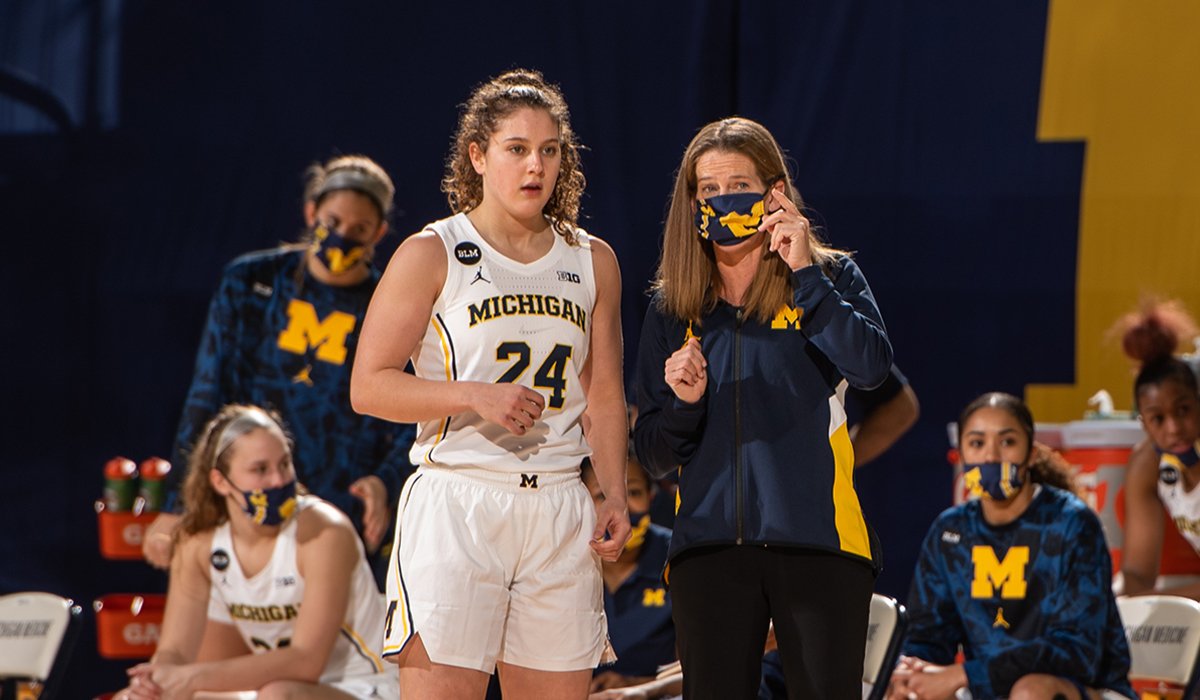
“All of us are very driven people,” says Anderson, a senior pursuing degrees in both biomedical engineering and movement science.
“I’ve had to learn my balance between not going to practice so I could finish up an assignment or go to office hours. So it’s helped me be more productive because I have a little bit less time on my hands.”
Several managers say they sacrificed part of their GPA for the real-world experience they got at Crisler. “I spent 40 hours a week on basketball,” says Ryan Kapustka, ’18, a head manager for the men’s team in 2017-18 and current director of basketball operations for Rice University’s men’s team. “I would spend late nights at the practice facility doing homework after practice. It wasn’t too tough to balance, but at the end I was spending a lot of time up there just because I knew that was where my career was heading and that’s how I was going to get another job.”
Colin Anschuetz, ’20, a head manager in the 2018-19 season who is now assistant men’s coach at Concordia University in Ann Arbor, agreed. “If you come in, work hard, keep your head down, and do your job, eventually after four years, the guys in the office are really comfortable picking up the phone and reaching out to somebody for you. … Knowing I wanted to go into coaching, that was almost more important to me than some of my classes.”
Indeed, several U-M alumni who worked with the teams have gone onto professional coaching or sports management jobs. Anschuetz’s older brother, Nolan, ’18, is manager of basketball logistics for the NBA’s Memphis Grizzlies. Devon Mulry, ’15, MM’16, MA’18, a head manager in the 2014-15 season and a graduate assistant with the men’s team from 2016 to 2018, is now director of player development for the University of Texas men’s squad.
“It’s like an internship; they get to be around and in it every single day, and they’re exposed to many different pieces,” Barnes Arico says. “It’s an opportunity for them to learn from the coaches at the highest level, the players at the highest level.”
Senior Lucas Vargas, a 2020-21 head manager for the women’s team who aspires to be a coach, sings Barnes Arico’s praises as a mentor. “She’s such a good teacher in how she breaks it down to the minor details. I’m there every day, and that means I get to listen to the points that she’s making to the players. You have opportunities to absorb everything that’s going on.”
Still, much of it is rather mundane work. Lemmer described a typical day: “We have that checklist throughout the practice to be able to prepare for the next thing and moving balls, moving cones, moving jerseys, doing administrative work like printing off plays or sending plays to iPads. The coaches may need something in a hurry — I remember numerous times running around the building to find things. The goal is to make sure the coaches can maximize their court time with the players.”
Some student managers quit when they realize the job is time-consuming and sometimes less than captivating. “The better player you were in high school, the more likely you are to go for a couple months as a manager and quit, because you have to completely sacrifice any ego you had about your own athletic ability,” says Sawyer, now an academic adviser at the University of Minnesota. He adds the physical elements of the position can be demanding. “When you’re rebounding for five straight minutes for Nik Stauskas shooting three pointers, you have to sprint. The expectation is Nik is going to try to break a record every time we do this drill.”
Agreed Lemmer: “For the most part, the fans are not going to know that managers even exist other than wondering who are these kids sitting on the bench with clipboards and computers? You don’t do it for glory.”
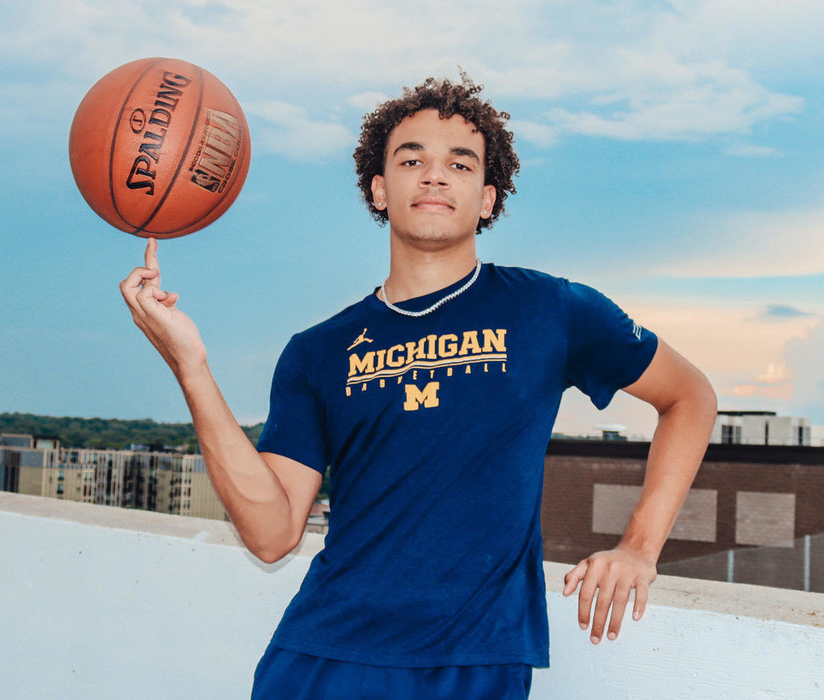
Given how all-consuming Division I basketball life is, it’s unsurprising that many managers become close with the players. Massey struck up a tight relationship with forward Isaiah Livers, for instance, because Livers regularly asked for him to rebound. “We just started hanging out a lot off the court; we talk pretty much every day and hang out every day we can,” Massey says. He and Colin Anschuetz both have roomed with point guard Eli Brooks, too. Says Anderson: “I consider the players like friends. We’re not the help. They’re so nice to us.”
The pandemic has made the past season uniquely challenging. The programs each had fewer than 10 student managers because Big Ten protocols required a robust, often daily COVID-19 testing routine. On the road, everyone eats their meals in their hotel rooms to avoid exposure, Vargas says. The twin successes of both squads in 2021, then, has made those difficulties feel more worthwhile, they say.
And everyone’s got treasured memories. Sawyer was on the bench in 2013 when Trey Burke hit the 30-foot buzzer-beating tie shot against Kansas that kept the team, bound for the finals, alive: “Being on a plane after punching a ticket to the Final Four, in the moment, it didn’t really feel real for someone like me who never felt like I’d be part of something like that. I mean, you see it on television and now you’re, you’re living it. Wow.”
Similarly, Kapustka was on the bench when Jordan Poole’s buzzer-beater defeated Houston in the 2018 NCAA Tournament, when the team returned to the finals. “One of the other head managers and I were going to run a couple bags down to the bus about three hours before the game, and the hotel lobby was already packed,” Kapustka said. “When we went down, the crowd was going crazy, screaming and telling us how much they loved us. We were just a couple of managers bringing a couple of equipment bags down to the bus.”
And Lemmer went snorkeling with the team when they flew to the Virgin Islands for a tournament and traveled across France and Italy with the squad for a series of international exhibition games. Even though he didn’t pursue a career in sports — he and his sister founded Iorio’s, a gelato shop in Ann Arbor, during college that is now a major supplier to restaurants and grocery stores — Lemmer is grateful for the experience. “I loved being in the gym, man,” he says. “I mean, how could you turn down having keys to Crisler and hanging around some world-class athletes all day?”
Steve Friess is a Michigan-based freelance journalist and a 2011-12 Knight-Wallace Fellow at U-M.
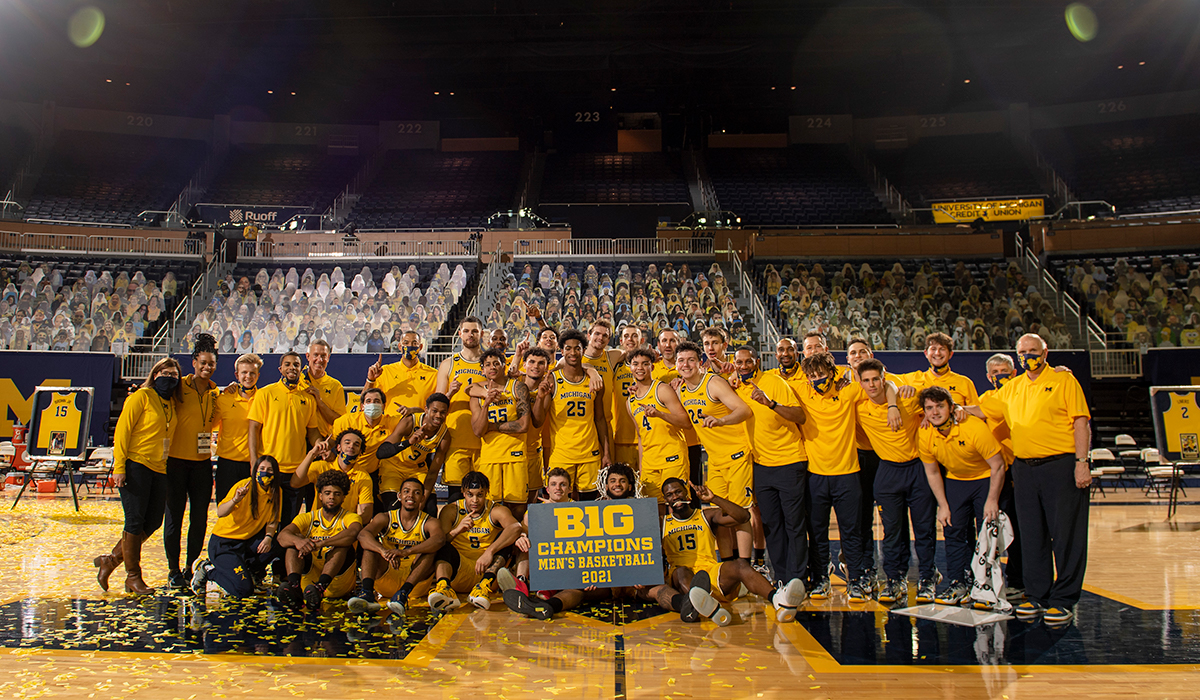
Winning Season
As this issue of Michigan Alumnus went to press, the U-M men’s and women’s basketball teams were on their way to the Big Ten Tournament in Indianapolis.
The No. 2-ranked men’s team (19-3, 14-3 Big Ten) also clinched the 2020-21 Big Ten Conference championship with its 69-50 victory over archrival Michigan State on March 4 in Crisler Center. The Big Ten regular season title was agreed to be determined by overall winning percentage as many schedules fluctuated due to the COVID-19 pandemic. The regular season crown is the 15th in U-M history and first since the Wolverines won the 2014 title. The title made the Wolverines the No. 1 seed in the Big Ten Tournament for just the second time in program history.
Juwan Howard, ’97, won 38 games during his second season as head coach, a record in program history for a second-year head coach.The 12th-ranked women’s team, led by head coach Kim Barnes Arico, earned a No. 4 seed in the Big Ten Tournament with a second-round bye. The Wolverines started the tournament March 11. The trip to Indianapolis capped a thrilling season (14-4, 9-4 Big Ten), with the team winning its first 10 games in a row.
Both the men and women were expected to be among those headed to the NCAA Tournament, with the women playing in San Antonio, Texas, and the men in Indianapolis.

